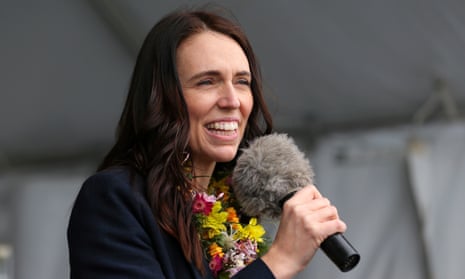“If you want to know me, look at my surface”, Andy Warhol once said, or something along those lines. It’s an invitation to the obvious that should apply in politics, and yet the public regard politicians with – at best – a good deal of suspicion and, at worst, contempt. And who can blame them? In New Zealand the workers’ party (Labour) was responsible for introducing and administering neoliberalism in the 1980s, a dramatic break with their social democratic history that the Australian Labor party was also undertaking in the 1980s, the US Democrats in the 1990s, and UK Labour shortly after. As the old joke goes, capturing the distrust most people feel for left and right, “it doesn’t matter who you vote for, a politician always gets in”.
But what distinguishes prime minister Jacinda Ardern from the politicians who bite at her heels is that the Warholian doctrine is probably true. At least in her case. In New Zealand’s double disasters – the Christchurch massacre and the Whakaari eruption – Ardern met each tragedy with immediate action, crisp and clear communication, and an extraordinary human care almost entirely absent in modern politics. She met with victims, their families took her into their own homes and at every opportunity she made an invitation to act in solidarity – from the country’s successful gun reforms to the “Christchurch call”, an international bid to stamp out violent extremism online.
When the prime minister met with families of the victims of the Christchurch massacre, publicly wearing a hijab out of respect for their grief, it was done so with a sincerity that struck true. Unlike, say, the phoney attempts that other politicians – for example, Canadian prime minister Justin Trudeau in India – made on foreign trips and in diverse communities. This sincerity is what underpins the impressive trust many New Zealanders place in the prime minister. In the latest polls Ardern is still registering in the 40s as preferred prime minister with her party, Labour, polling equally well.
That’s remarkable in itself. With almost a third of the country still in lockdown it’s surprising that Ardern and Labour aren’t polling lower. In the 1 News Colmar Brunton poll Labour fell two points to 41% and in the Newshub-Reid Research the party is down 0.3 points to 42.7%. That stubborn level of support, despite the sustained hardships of 2020 and 2021, is quite something. But the explanation behind it is deceptively simple: in a crisis, you want Jacinda Ardern. The National party’s Judith Collins can barely muster a couple of percentage points.
Of course, you could read numbers in the low 40s as rather ordinary. The prime minister’s predecessor, the centrist John Key, would regularly poll over 50%, an astonishing figure under proportional representation because that’s precisely what the system is meant to prevent – outright majorities. Key had his own international cachet as well as a former Merrill Lynch trader – his nickname on the floor: the smiling assassin – and former head of the International Democratic Union, an association of leading conservative parties. Key was also the prime minister that his mate, Australia’s Malcolm Turnbull, always wanted to be.
Key’s local and international support was always found in that he could oil the engine – centrism – and grease up its parts – the voters. His pitch in 2008 was that as an insider (a banker) he had the skills to navigate New Zealand through the Global Financial Crisis (GFC). Illogically, it worked, and Key was enduringly popular because of it. But he and his National party governed in comparatively easy times. Even during the financial crisis New Zealand was largely protected against overexposure to international financial markets, most household and business debts were held locally or in Australia, a booming commodities market in Australia and China meant demand from export markets was high, and near zero levels of government debt inherited from the previous Labour government meant the hard spending decisions were never made.
But what distinguishes Ardern and her Labour government’s time in power is that she has been forced to confront a series of rolling crises. The virus chief among them. Her successful handling of the outbreaks in 2020 saw her secure the first mixed-member proportional representation majority at the 2020 election. Her somewhat successful handling of the latest outbreak means her numbers remain relatively robust. This is an achievement in itself when the virus is slowly spreading across the country, the vaccine mandate begins to bite as a small number of people lose their jobs, and more people than at any other point in the last ten years are uncertain about the country’s future direction.
Former president Donald Trump, British prime minister Boris Johnson, Italy’s Matteo Salvini, Hungary’s Viktor Orbán, Brazil’s Jair Bolsonaro, and their contemporaries across the world are reactionaries and authoritarians even the most committed accelerationist would struggle to invent. But where their respective countries can offer nothing more than the exhausted rearguard of radical centrism – president Joe Biden, UK Labour leader Keir Starmer, and so on – New Zealand offers a straight up social democrat. Ardern is imperfect, and her government usually struggles to implement its agenda, whether housebuilding or climate change action. But one aspect where the prime minister and her government excel is dealing with an immediate crisis. For that, most New Zealanders are thankful. And for the time being, the polls will hold because of it.
Morgan Godfery (Te Pahipoto, Sāmoa) is a senior lecturer at the University of Otago and a columnist at Metro
